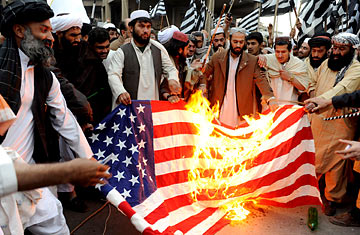
Supporters of the religious party Jamiat Ulema-e-Islam in Quetta, Pakistan, protest the conviction of a Pakistani woman by a U.S. court
From the Pakistani army barracks to the roadside chai stands along the Indus River where truckers gulp down cups of muddy tea, anti-Americanism is roiling across the country. It is whipped up by the often sensationalist, ratings-hungry Pakistani TV news talk shows — think of Fox News cranked up to full volume, in Urdu. It resounds from the mosques, in virulent anti-U.S. sermons during Friday prayers. But most ominously, according to Islamabad observers, this deep suspicion of America's intentions in the region seems to be shared by elements within Pakistan's powerful military and intelligence services.
Here's a sample of a few conspiracy theories making the rounds: the U.S. military has a secret plan to seize Pakistan's nuclear arsenal; more than 9,000 agents of Blackwater, the U.S. security company, now called Xe Services, are roaming the country like bogeymen, at the CIA's behest, kidnapping people and setting off bombs that are later blamed on Pakistani Taliban militants; B-52 bombers are constantly circling the skies over Pakistan, waiting to strike when the signal is given (to strike what is never exactly clear from the rumors).
Even as the wild speculation circulates, U.S. diplomats are harassed in real life by Pakistani authorities. Their vehicles are seized and their visas tangled in bureaucratic red tape for months, crippling aid projects and counterinsurgency efforts. Sometimes photos of their residences are published in newspapers and labeled as CIA dens. American journalists, too, are singled out. Last October, an English-language Lahore newspaper, The Nation, accused a Wall Street Journal correspondent of working simultaneously for the CIA, the Israeli spy agency Mossad and, to top it off, Blackwater. A Pakistani daily also ran a photo of two British and Australian journalists at the site of a suicide bombing and insinuated that they were foreign spies.
This anti-U.S. resentment strikes many in Washington as a tad ungrateful — not to mention misplaced — given that last fall, Congress enacted the Kerry-Lugar bill granting Pakistan over $7.5 billion in economic aid over the next five years. In addition, Pakistan receives military hardware and training to combat Pakistani Taliban — whose wrath is focused on Islamabad — in the mountainous borderlands with Afghanistan.
So what gives?
Pakistan has long been characterized as a country whose rulers may be pro-American but whose people are decidedly not. In 1979, for example, Pakistani radio falsely reported that U.S. aircraft bombed Islam's holiest site in Mecca, prompting a mob to storm the U.S. embassy in Islamabad, killing five American and Pakistani staffers. This simmering hostility was stirred again after the U.S.-led invasion of Afghanistan in October 2001 and boiled over, more recently, with drone missile strikes inside Pakistan's tribal territory in which dozens of suspected terrorists — and civilians — died. The Feb. 3 conviction in New York City of a Pakistani woman scientist, Aafia Siddiqui, nicknamed Lady al-Qaeda, on charges of trying to shoot Americans in Afghanistan has also ignited anger in Pakistan against the U.S. The verdict was decried by Pakistan's President Asif Ali Zardari and lawmakers and sparked anti-U.S. protest rallies in Lahore.
On top of that, Washington's latest act of largesse, the Kerry-Lugar bill, has unintentionally riled the Pakistani army. The billions came with strings attached. The generals opposed one of the conditions of the bill: that the U.S. must be satisfied that the Pakistani military was fighting terrorism and not, as the legislation said, "subverting the political and judicial processes of Pakistan." Says Talat Masood, a retired general and military analyst in Islamabad: "Some in the army think this is intrusive and a loss to our sovereignty."
Islamabad politicians and diplomats say that the military opposes any measure that might boost the current President, who was swept into power in 2008 on a sympathy vote for his late wife, Benazir Bhutto, assassinated the previous year. Zardari has been dogged by old corruption charges and his current administration has proved highly unpopular, allowing the army to take a commanding role in security and foreign affairs, and that includes dealing with Washington.
The conditions for a perfect storm of anti-U.S. feeling have risen, according to Samina Ahmed, director for the International Crisis Group in Islamabad. "What we're seeing is a nexus between an irresponsible media, the mullahs and the military, which is using anti-Americanism to beat a weak civilian government on the head," she says. Ahmed suggests that while the Obama Administration may need the generals' support in the fight against the Taliban and al-Qaeda — who have sanctuaries inside Pakistan's tribal territories — it should not falter in trying to prop up the country's civil institutions. Otherwise, she says, the root causes of illiteracy and poverty that have given rise to militancy in the country will never be tackled, and Pakistan will remain in its downward spiral.
Meanwhile, U.S. diplomats in Islamabad, instead of ignoring the outlandish whoppers on local TV news channels, are moving more swiftly to deny them before they spread and gain credence. Military analyst Masood suggests that the U.S. State and Defense officials who are constantly shuttling to Islamabad should offer the military assurance that Washington has no intention of meddling with their nuclear arsenal or with their defenses against rival neighbor India. "The Americans have to take measures that lower the paranoia. They have to persuade the army that the U.S. is not after Pakistan's nukes," he says. Given the fever pitch of suspicion that Pakistanis feel toward the U.S. these days, that may take a lot of persuasion.
